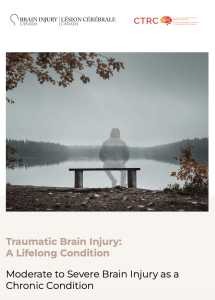The Silent Suffering of Canadians Living with Traumatic Brain Injury – National Figures Expose the Nationwide Neglect of Individuals and Their Families
 A significant collaboration between Brain Injury Canada and the Canadian Traumatic Brain Injury Research Consortium (CTRC) called for moderate to severe Traumatic Brain Injury (TBI) to be officially classified as a chronic condition in Canada. This move would significantly enhance nationwide healthcare strategies, policies, and patient outcomes.
A significant collaboration between Brain Injury Canada and the Canadian Traumatic Brain Injury Research Consortium (CTRC) called for moderate to severe Traumatic Brain Injury (TBI) to be officially classified as a chronic condition in Canada. This move would significantly enhance nationwide healthcare strategies, policies, and patient outcomes.
“My severe brain injury just didn’t happen to me. It happened to my whole family,” said Barb Butler, a former teacher from Regina who was seriously injured in a motor vehicle accident in 1993. “My husband suddenly didn’t have his wife, and our children didn’t have their mother. The injury never goes away, and you are never the same person you once were.”
This announcement marks a significant milestone in the recognition and proposed designation of moderate to severe TBI that impacts Canadians of all ages. Primarily caused by motor vehicle collisions in the younger population and falls among the elderly, this condition continues to be the leading cause of death and disability in children, youth, and adults under 40.
Despite the persistence of cognitive, behavioural, physical, and emotional impairments throughout a person’s life – a profile aligning with the World Health Organization’s definition of a chronic disease – the Canadian healthcare system is currently geared towards its management as a single event rather than a chronic condition. This significant gap leaves affected individuals and their families to manage brain injury’s profound, lifelong challenges without consistent and essential support.
Data in a groundbreaking position paper released today highlighted the staggering, broad societal impacts of TBI:
- Over 50% of Canada’s homeless population report a history of TBI
- TBI patients are 2.5 times more likely to be incarcerated
- TBI disproportionately affects Indigenous Canadians due to poverty, inadequate housing, limited healthcare access, and inter-generational trauma
- Among Canadian women who have survived intimate partner violence, 60% reported a TBI history
- TBI is linked to a 50% increase in psychological distress and nearly triple the suicide attempt rate among school-aged Canadians
- Post-TBI, the employment rate drops drastically from 75% to 13%
- Contrary to older theories, new data links moderate to severe TBI to ongoing cognitive and neurological decline
“The emotional, physical, and financial strain of TBI are all-encompassing, spanning direct healthcare costs, lost productivity, and intensive, daily stress for individuals and their families,” said Michelle McDonald, CEO of Brain Injury Canada. “An official recognition of TBI as a chronic condition could mean a world of difference in ensuring that continuous care, support, and rehabilitation services for TBI patients are available nationwide.”
Recognizing TBI as a chronic condition within the Canadian Chronic Disease Surveillance System would allow for standardized data gathering, healthcare utilization tracking, and management research. It could also help address the disparities of care nationwide and the fragmented nature of program funding for TBI patient care.
The call to action is also an urgent response to emerging research that TBI can lead to a progressive neurodegenerative process like Alzheimer’s and Parkinson’s.
“Recognizing TBI as a chronic condition is pivotal for improving patient outcomes and tackling this public health issue,” stated Dr. Jamie Hutchison and Dr. Alexis Turgeon, Co-Chairs of the Canadian Traumatic Brain Injury Research Consortium. “This would allow us to improve our knowledge of this major health condition and help us improve outcomes for TBI by identifying more effective treatments and interventions. We believe high-quality research will significantly improve the quality of life for individuals and those who care for them, as the daily requirements of moderate to severe TBI often become more challenging over time.”
In a nation grappling with the wide-ranging effects of TBI, this initiative could spark a wave of improved healthcare strategies and policies, leading to enhanced outcomes for those suffering from moderate to severe TBI.
Click HERE to access the position paper Moderate to Severe Traumatic Brain Injury: A Lifelong Condition.
Press:
“The ask is simple and straightforward: Classify traumatic brain injury (TBI) as a chronic condition.”
See André Picard’s piece in the Globe and Mail about our position paper calling for the classification of moderate to severe traumatic brain injury as a chronic condition. Read the article.
About Brain Injury Canada
Brain Injury Canada is a national non-profit advocacy organization dedicated to enhancing the quality of life for individuals living with brain injury.
About The Canadian Traumatic Brain Injury Research Consortium
The Canadian Traumatic Brain Injury Research Consortium is a collaboration of health care professionals, researchers, and advocates aiming to improve patient care and outcomes for individuals with TBI.
www.ctrc-ccrt.ca